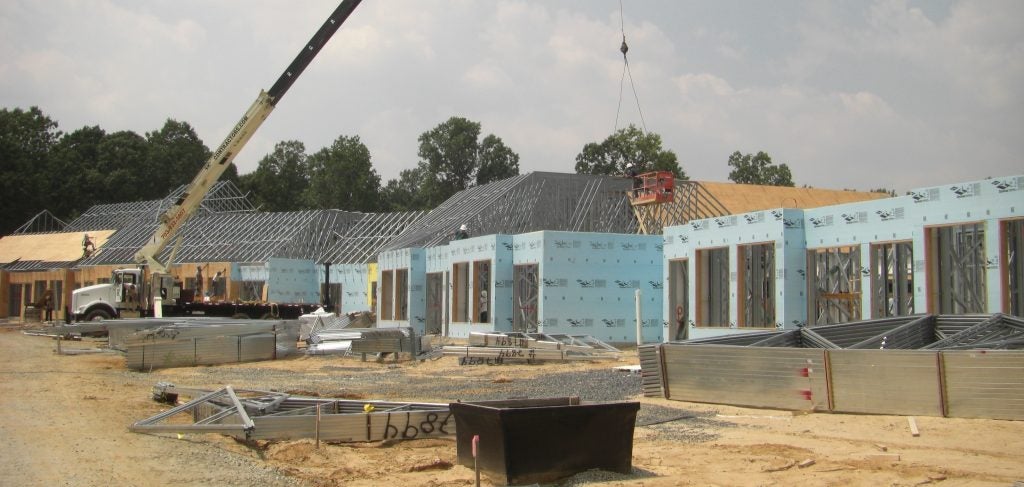Delaware Hospice serves growing aging population
As Delaware's population continues to skew older, the nonprofit Delaware Hospice has expansion plans to serve an aging population that continues to grow.
For 35 years, Delaware Hospice has been helping patients and families face the end of life. As Delaware’s population continues to skew older, the nonprofit has expansion plans to serve an aging population that continues to grow.
Delaware Hospice serves hundreds of patients every day, most often in the patient’s home. But some patients are also treated at the Delaware Hospice Center in Milford. Set in a quiet corner of southern Delaware, more than 5,000 patients have come through the center since it was built ten years ago. Inside, patients receive medical care, while family members are taught how to provide care for their ailing loved ones.

“The goal is to make people feel at home, in very comfortable surroundings, and make family, as well, visiting them feel at home as we attend to our patient’s needs,” said Dr. Andrew Himelstein. He’s been an advisor at Delaware Hospice for more than two decades and has served as medical director for the past 16 years.
“I look at hospice care as really being life-affirming. We all have a limited time, we don’t know what that will be, but for patients who have a serious illness, being able to spend time in a way that’s meaningful for them, with their loved ones, is really very, very important.”
As Delaware’s population ages, the need for hospice care is increasing. “The graying population in Sussex County is growing and I would say that the majority of my caseload is from the baby boomer generation and that’s what Sussex County is,” Himelstein said.
Southern Delaware has seen a big growth in seniors moving in, and that trend is expected to continue for decades to come. In 2000, Sussex County’s over 65 population was at 29,022, or about 18 percent of the county’s residents. By 2010, residents over 65 numbered 41,073, or about 21 percent of the county population.
By 2030, the Delaware Population Consortium’s annual population projection predicts a 48 percent increase in the over 65 population in Sussex County. The group expects nearly 80,000 residents age 65 or older will be living in Sussex by 2030. By 2030, the population of Sussex residents over the age of 85 is expected to increase by 127 percent from about 6,000 in 2015 to 13,500 by 2030. Further out, the over 85 population in Sussex will grow to more than 20,000 residents, a 236 percent jump from 2015.
“We definitely see more need,” said Delaware Hospice president and CEO Susan Lloyd. “The baby boomer population continues to grow, but we also know that we have the influx of a lot of new people to our community, particularly here in Sussex County, so we expect the demand for our kind of services will continue to increase.”
The Milford center provides care for patients from local hospitals and nursing homes, as well as clients who had been receiving hospice care in their homes.
“Our job is to manage symptoms, send them back to their home care setting,” said Debbie Taylor, clinical supervisor at the center. “I have this saying here: our social workers work on … sending them home physically or heavenly.”
While the Milford center offers complete nursing care, it’s designed not to look like a typical care facility, with medical equipment hidden in cabinets, carpeted floors and even a kitchen for family to cook meals in.
“We have elderly spouses caring for elderly patients, and they’re able to stay here in the room with them, and again with our family kitchen, our shower area, they’re able to continue on with their lifestyle as well as learn and be educated about how to keep their loved one comfortable at home,” Taylor said.
Keeping loved ones comfortable is the mission of hospice, whether at the Milford center or in their own home. Steven Swierzy of Lewes now volunteers with Delaware Hospice because of the care his mother received.
“My mother moved in with me in 2014 and she had Parkinson’s disease for 25 years, so she just came to a point where we had to keep an eye on her a lot more, so we decided to move her into my home.”
As his mother’s condition worsened, he got much needed help from Delaware Hospice.
“It was amazing. It was like, if you can think of getting help like troops coming in after a hurricane, that’s what it felt like to me,” Swierzy said. “All of the sudden I had these people coming in to help me make the decisions I was making on my own, and not sure if they were right or wrong.”
Through their Transitions program, Delaware Hospice workers help patients and families deal with other needs beyond the physical illness:
“It can be a variety of things, I’ve helped individuals pay their electric bill,” said Kristy Handley, senior transitions coordinator. “That’s because their medical costs have gotten so high that they can’t afford to keep the electric on or figure out a way, how can I still get my medications and live at home and take care of myself.”
Getting those medications at home was critical for Steve Swierzy caring for his mother.
“When you see somebody in pain, to be able to treat it right away is so important,” said Swierzy, as he wiped tears away from his eyes. “To have somebody to call and get your answer right away instead of trying [to figure out] what am I supposed to do, am I supposed to get her to the hospital, should I get an ambulance? I have people there right away to tell you, ‘This is the best thing to do for you mother,’ it’s so important because it’s very stressful.”
The next step in the growth of Delaware Hospice is construction of a second hospice center in Newark to serve residents in New Castle County. “We have been out raising money for that project for some time, so that we are very hopeful that in the next few years we will be able to break ground and have another location just like this available to New Castle County,” Lloyd said. “It’s a ten million dollar campaign, and we’re at about $7.1 [million] right now.”
Part of the way Delaware Hospice serves its patients and their families is by never charging for their work. While the traditional hospice care they provide is covered by Medicare, other services like the transitions program and a program for children are funded by donations and fundraising. “We think of ourselves as an organization by the community, for the community, so we feel very gratified that we get a lot of fundraising support from the community to help us do all these services,” Lloyd said.
While raising money to provide service for more patients, Delaware Hospice workers are also on a mission to better educate the public about what hospice is and what it is not.
“They still think about it as death, and that is not what hospice care is about,” Lloyd said. “It’s support, it’s education, it’s resources to the patient and their family as they’re dealing with a serious illness, and it’s all the supports they’re afforded after the patient passes.”
Lloyd said people aren’t familiar with what hospice offers, in part, because they don’t like to think about the end of life. “We do a lot of planning in our life, financial planning, education, lots of things, our life plan, but when we get near end of life, we don’t stop and think about that, and yet, you don’t want to make those decisions when it’s a crisis.”
Steven Swierzy thinks hospice got a bad reputation in the 1980s. “When AIDS came out, hospice was where people went to die, that was huge, that was all over the news and so that gave it a stigma: this is where people go to die,” Swierzy said. “That’s what people think. Everybody dies, but it’s not what it’s all about. That’s what I want to let people know.”
WHYY is your source for fact-based, in-depth journalism and information. As a nonprofit organization, we rely on financial support from readers like you. Please give today.





